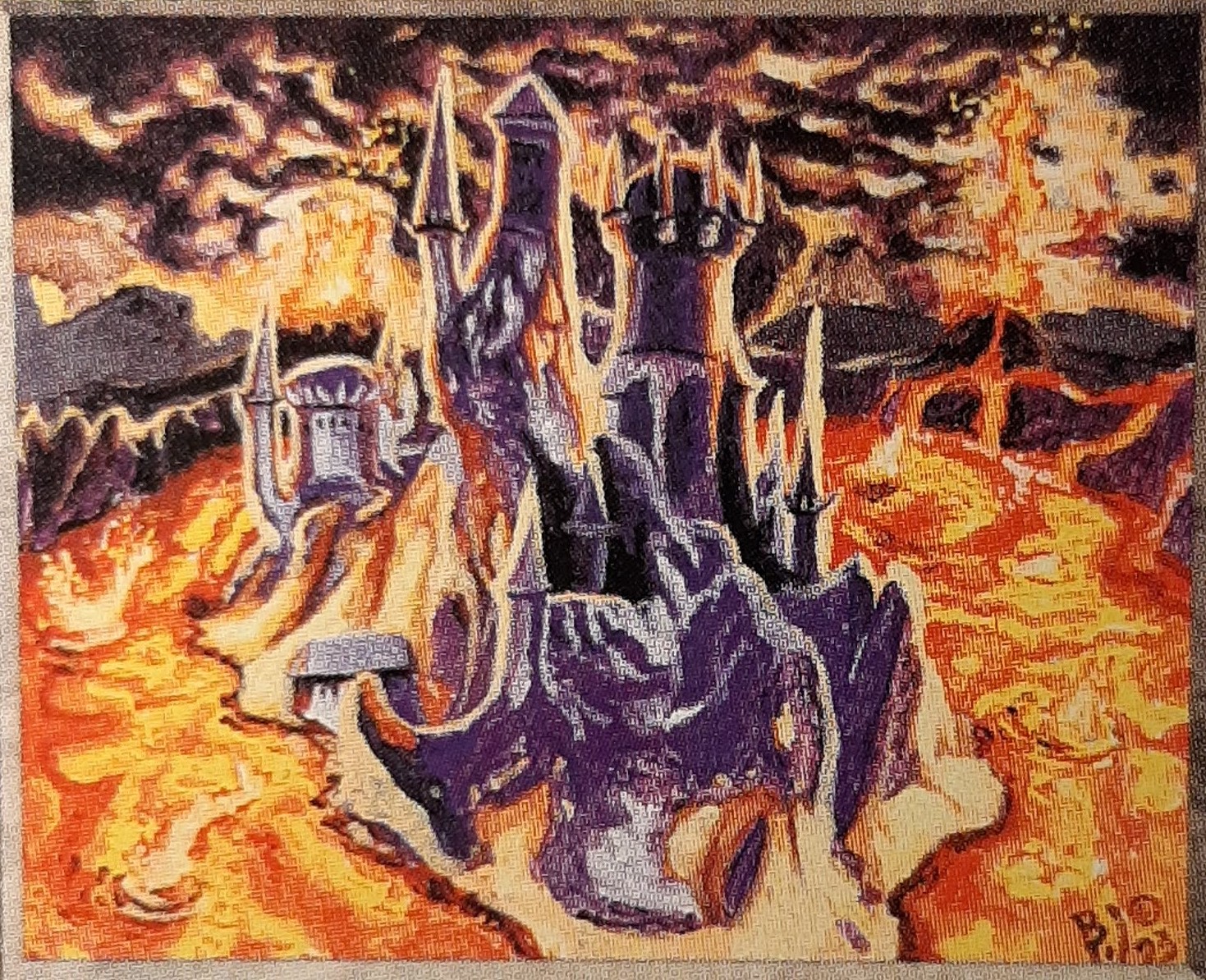Are you a Quiet Speculation member?
If not, now is a perfect time to join up! Our powerful tools, breaking-news analysis, and exclusive Discord channel will make sure you stay up to date and ahead of the curve.
Resignedly beneath the sky
The melancholy waters lie.
So blend the turrets and shadows there
That all seem pendulous in air,
While from a proud tower in town
Death looks gigantically down.
Edgar Allan Poe, The City in the Sea
This excerpt, from "The City in the Sea" by Edgar Allan Poe, is a classic of gothic fiction. Not only that, but it’s also the flavor text of Urborg, one of the most famous lands in Magic’s history. Interestingly, this poem has a few similarities with "Kubla Khan", which is why I have chosen it as a bridge between Samuel Taylor Coleridge and Poe. Both are among the most quoted English-speaking authors in Magic, and as we’ll see they share several common traits. So, let’s move from the UK to the US, and from the romanticism of Coleridge to the gothic horror of Poe.

Edgar Allan Poe
Five unique cards were printed with a quotation from American author Poe. That is, one less than Coleridge. Where Coleridge only appeared on cards from Alpha and Portal, Poe shows up in many different editions. He is quoted on cards from Alpha, Legends, Fifth Edition, and Eighth Edition. Let's examine these five cards in detail, and then draw some conclusions by comparing these first two English-speaking authors.
Frozen Shade
There are some qualities—some incorporate things,
That have a double life, which thus is made
A type of twin entity which springs
From matter and light, evinced in solid and shade.
We begin with one of the two cards from Limited Edition Alpha on which Poe appears. This one is a common black creature, with the typical creature class of "Shade." One of the most famous shade cards is Ihsan's Shade, although the best one from a power level perspective is probably Nantuko Shade, printed many years later. Even though it's underpowered by comparison, Frozen Shade is the archetype of this subtheme, exhibiting the typical "pump" effect characteristic to the class.
The poem quoted in the flavor text is "Silence" (1839), a short composition of 15 lines. Four lines from the beginning of the poem are directly quoted on Frozen Shade. The meter is hendecasyllabic, i.e., verses of eleven syllables each, and the poem deals with the opposition between the death of the body and that of the soul.
There is no evident reason to choose this quote for this card, apart from the presence of the word "shade" at the end of the fourth line. Nonetheless, it conveys a certain ominous aura that goes well with the first Shade ever in the game.
Phantom Monster
While, like a ghastly rapid river,
Through the pale door,
A hideous throng rush out forever,
And laugh—but smile no more.
The other card from Alpha with a Poe quote is a creature again. This time, it's a blue uncommon. Phantom Monster is a 3/3 Illusion (formerly Phantasm) with flying for the cost of four mana. It's the typical creature you'd be happy to play in your draft pool, nowadays, but apart from that nothing special.
The illustration by Jesper Myrfors (the original art director of Magic) depicts a weird-looking being, that as far as I'm concerned seems almost Lovecraftian. As for the flavor text, it quotes another poem by Poe, this time "The Haunted Palace". It's from the same year as "Silence", 1839, but with its nearly fifty lines it's a bit longer. In Frozen Shade it was the opening lines that were quoted, while in this case, it's the final four.
The poem deals with evil forces and the doom of a king living in a high palace. Most of it is described from the point of view of passers-by, assisting to the progressive damnation of the king and his palace. Just before the lines of flavor text, the poem mentions travelers seeing: "Vast forms that move fantastically / To a discordant melody"—another spooky bit evoking the formlessness of a "phantom" being.
Urborg
Resignedly beneath the sky
The melancholy waters lie.
So blend the turrets and shadows there
That all seem pendulous in air,
While from a proud tower in town
Death looks gigantically down.
Urborg is famously one of the regions with the highest concentration of black mana in Dominaria, the primary setting for the majority of early Magic sets (excluding Arabian Nights). While we get a demonstration of this fact from the more recent Urborg, Tomb of Yawgmoth, the original Urborg is much less impressive. Apart from tapping for black mana, as you'd expect, it lets you remove the ability of first strike or swampwalk from a target creature. A weirdly specific effect, and not one that saw much play.
On the other hand, this legendary land from the set Legends is great from an aesthetic perspective. The art by Bryon Wackwitz conjures a haunted palace surrounded by lava, with warm, violent colors such as purple and orange. The quotation comes from Poe's "The City in the Sea" (1845). The rhythm of this poem is that of tetrameter, consisting of four "feet" and thus four main accents. It's funny because this is actually the most common meter used in nursery rhymes, creating an uncanny effect when featured on such a dark card.
Marsh Viper
And the seraphs sob at vermin fangs
In human gore imbued.
With Marsh Viper we are moving forward a few years. A green creature first printed in The Dark (1994), Marsh Viper received this flavor text for its reprint in Fifth Edition (1997). The poem by Poe is "The Conqueror Worm" (1843). It is comprised of 40 lines concerning human mortality and the vanity of life.
The specific quotation used consists of two verses located approximately in the middle of the poem. It describes a play where human-like figures are hastening in vain about the stage until they get devoured by a monstrous "crawling shape." The closure of the poem reveals that the tragedy is called "Man" and the only true hero is the "Conqueror Worm," or death.
Once more, this shows us how the best cards from a lore perspective are often those with lower power levels. Marsh Viper is interesting because it's among the earliest cards mentioning poison counters, many years before Scars of Mirrodin. Apart from that, it doesn't see much play, and the greatness of its tragic flavor text gets perhaps even stronger on such a humble card.
Death Pits of Rath
Neither could I forget what I had read of these pits that the sudden extinction of life formed no part of their most horrible plan.
The last card we are analyzing today is Death Pits of Rath from Eighth Edition (2003). First printed in Tempest (1997), It wasn't until it was reprinted a few years later that it acquired this flavor text. It was kept for the Ninth Edition reprint two years later as well.
This black enchantment makes every creature that gets damaged die. It's a spectacular effect (as dramatic as it is unplayable), and the art shows another spectacular scene of horror. As for the quote, it comes from one of Poe's most famous tales, "The Pit and the Pendulum" (1842).
It's the first quotation we see of prose from Poe. The other four flavor texts were all verses taken from his poems. The quote plays with the concept of "sudden extinction of life," contextually implying that there is no interest here in killing people quickly, but rather in torturing them. Suitably, the quote puts us on the outside looking in, trying to comprehend a horrific force beyond our understanding.
Conclusions
To sum up, we can see a few parallels between the quotations by Coleridge and those of Poe. First, most of the cards that got a quote from one of these poets are black cards. That's not surprising, as both authors are known for their dark, eerie themes. Even when they appear on cards from other colors, there is always some kind of ominous or dark-themed quality. Think of the poison counters from Marsh Viper or the anti-swampwalk ability of Urborg.
Second, there is a strong tendency towards poetry over prose. Both Coleridge and Poe left many writings in prose, but on Magic cards, they got almost totally neglected. We will see in the course of the next articles whether this only happens with Poe and Coleridge or whether it is a wider trend across flavor texts as a whole.
As for their differences, at least when it comes to Magic, I see a slight shift. While Coleridge's quotes were commonly describing physical beings, such as rats or zombies, Poe's evoke more phantasmic entities, such as shades or illusions. What will other English-speaking authors have to offer? Stay tuned for the next installment where we'll explore other English-speaking authors quoted in Magic cards.




